Josta, a relatively obscure fruit derived from a hybrid between the blackcurrant (Ribes nigrum) and the gooseberry (Ribes uva-crispa), is gaining attention for its potential health benefits. With its unique combination of nutrients and bioactive compounds, Josta offers a range of health advantages supported by scientific research. This article explores the benefits of consuming Josta, highlighting relevant scientific studies.
 Rich in Antioxidants
Rich in Antioxidants
Josta berries are known for their high antioxidant content. Antioxidants are crucial for neutralizing free radicals in the body, which can reduce oxidative stress and lower the risk of chronic diseases. A study published in the Journal of Agricultural and Food Chemistry found that Josta berries contain significant levels of anthocyanins, flavonoids, and vitamin C, all of which are potent antioxidants.
Additionally, Josta berries contain unique combinations of both blackcurrant and gooseberry antioxidants, making them particularly potent compared to other berries. The high levels of anthocyanins not only give Josta its deep, dark color but also contribute to its superior antioxidant properties. Anthocyanins have been linked to reduced inflammation and improved cardiovascular health, making Josta berries especially beneficial for heart protection.
What sets Josta apart from other fruits is its remarkable concentration of polyphenols and vitamin C, which work synergistically to enhance its antioxidant capacity. The polyphenols in Josta berries are known to combat cellular damage and may even play a role in reducing the risk of certain cancers. This combination of antioxidants is especially rare in most other berries, positioning Josta as an exceptional source for protecting the body against oxidative stress and promoting overall longevity.
 Anti-Inflammatory Properties
Anti-Inflammatory Properties
Chronic inflammation is linked to various health issues, including cardiovascular disease, diabetes, and cancer. Research has shown that the bioactive compounds in Josta, particularly its anthocyanins, possess anti-inflammatory properties. A study in Food & Function demonstrated that anthocyanins from Josta can inhibit inflammatory pathways and reduce markers of inflammation in the body.
One of the key differentiators of Josta is its unusually high concentration of quercetin, a flavonoid known for its strong anti-inflammatory effects. Quercetin works by inhibiting pro-inflammatory enzymes and signaling molecules, such as cytokines and COX-2, which are responsible for chronic inflammation in conditions like arthritis and heart disease. This high quercetin content sets Josta apart from other fruits like blueberries or raspberries, giving it an edge in targeting specific inflammatory pathways more effectively.
Moreover, the anti-inflammatory effects of Josta are not limited to its anthocyanins and flavonoids. The berries also contain moderate levels of gamma-linolenic acid (GLA), a lesser-known omega-6 fatty acid with anti-inflammatory benefits. GLA helps modulate inflammatory responses by promoting the production of anti-inflammatory prostaglandins, further contributing to the unique profile of Josta as a powerful natural remedy for inflammation-related conditions.
 Supports Immune Function
Supports Immune Function
Josta is also beneficial for immune health. The high vitamin C content in Josta berries enhances the immune system by promoting the production of white blood cells and improving their function. A review published in Nutrients emphasized the role of vitamin C in boosting immune responses and its importance in preventing infections.
In addition to vitamin C, Josta berries are rich in anthocyanins and flavonoids, powerful antioxidants that further support immune function by reducing oxidative stress and inflammation. These compounds help neutralize free radicals, which can damage cells and impair immune responses. Anthocyanins, in particular, have been shown to modulate immune cell activity, enhancing the body’s ability to defend against pathogens. A study in Phytotherapy Research highlighted that the combination of these antioxidants in Josta berries can improve the body’s resistance to infections more effectively than vitamin C alone.
Moreover, Josta berries contain significant levels of vitamin K and manganese, which contribute to overall immune health in unique ways. Vitamin K plays a crucial role in the regulation of immune responses and inflammation, helping to maintain balance and prevent overactive immune reactions that can cause tissue damage. Manganese, an essential trace mineral found in Josta, supports the production of enzymes that are vital for immune defense mechanisms.
 Promotes Heart Health
Promotes Heart Health
Heart disease remains a leading cause of mortality globally. Josta berries may support cardiovascular health through their antioxidant and anti-inflammatory effects. Research in the American Journal of Clinical Nutrition has shown that the consumption of antioxidant-rich fruits, including Josta, can improve endothelial function and reduce blood pressure, which are crucial factors in maintaining heart health.
In addition to their general antioxidant content, Josta berries are particularly rich in anthocyanins and flavonoids, which are known to offer specific cardiovascular benefits. Anthocyanins, the compounds responsible for the berry’s dark color, have been shown to improve blood vessel elasticity and reduce arterial stiffness. This can help to lower the risk of atherosclerosis, a condition where arteries harden and narrow due to plaque buildup.
Moreover, Josta berries also contain notable levels of potassium, a mineral critical for regulating blood pressure. Potassium helps counteract the effects of sodium in the body, easing tension in blood vessel walls and promoting a healthy balance of fluids. Unlike many other berries, Josta’s higher potassium content makes it particularly beneficial for maintaining heart rhythm and preventing hypertension.
 Potential Anti-Cancer Effects
Potential Anti-Cancer Effects
Emerging research suggests that Josta may have potential anti-cancer properties. The polyphenolic compounds in Josta have been shown to exhibit anti-cancer effects in various studies. A study in Cancer Letters indicated that the polyphenols from berries like Josta can inhibit cancer cell proliferation and induce apoptosis (programmed cell death) in tumor cells.
Additionally, Josta berries are particularly rich in anthocyanins. Anthocyanins have been studied extensively for their anti-cancer potential due to their strong antioxidant properties. These compounds help neutralize free radicals, which can cause oxidative damage to cells and DNA, a key factor in the development of cancer. Josta’s anthocyanin content is notably higher than that of some other berries, which could give it a unique edge in cancer prevention.
 Improves Digestive Health
Improves Digestive Health
Josta berries are a good source of dietary fiber, which plays a crucial role in maintaining digestive health. Fiber helps regulate bowel movements, prevent constipation, and promote a healthy gut microbiota. A study published in Journal of Nutritional Biochemistry highlighted that fiber intake is associated with a lower risk of gastrointestinal disorders and improves overall gut health.
In addition to its fiber content, Josta berries stand out for their high levels of anthocyanins and polyphenols, compounds known for their anti-inflammatory and antioxidant properties. These bioactive substances not only protect the gut lining from oxidative stress but also promote the growth of beneficial gut bacteria. According to research published in Frontiers in Microbiology, polyphenols can positively modulate the gut microbiota by enhancing the abundance of probiotics like Bifidobacteria and Lactobacillus, which play a key role in maintaining digestive health.
Moreover, Josta berries contain moderate levels of vitamin C, which, while often associated with immune support, also contributes to digestive wellness. Vitamin C aids in the absorption of non-heme iron, which is essential for maintaining gut function and preventing anemia-related digestive issues. The combined effects of fiber, antioxidants, and vitamins make Josta berries particularly effective in supporting overall digestive health, distinguishing them from other fruits with similar benefits.
Enhances Skin Health
The high vitamin C content in Josta not only supports immune function but also promotes healthy skin. Vitamin C is essential for collagen synthesis, which maintains skin elasticity and reduces signs of aging. According to research in Dermatology Research and Practice, antioxidants like vitamin C can protect the skin from oxidative damage caused by UV radiation and pollution, thereby enhancing skin health and appearance.
Moreover, the berry’s high concentration of essential fatty acids aids in strengthening the skin’s barrier function, helping to lock in moisture and prevent dehydration. This feature is especially beneficial for individuals with dry or sensitive skin, as it helps the skin retain its natural moisture balance while reducing irritation. By nourishing the skin both from within and from the outside, Josta berries offer a comprehensive approach to maintaining healthy, resilient skin.
Regulates Blood Sugar Levels
Managing blood sugar levels is vital for individuals with diabetes or insulin resistance. Josta berries contain compounds that may help regulate blood sugar levels. A study published in Diabetes Research and Clinical Practice found that certain berry extracts, including Josta, can improve insulin sensitivity and reduce postprandial blood glucose levels.
In particular, Josta berries are rich in anthocyanins, a class of flavonoids known for their ability to improve glucose metabolism. Anthocyanins have been shown to enhance insulin secretion and reduce inflammation, both of which are crucial for maintaining healthy blood sugar levels. Compared to other berries, Josta has a unique combination of anthocyanins and polyphenols, which may give it an edge in supporting better glycemic control.
Moreover, Josta’s relatively low glycemic index (GI) means it has a milder impact on blood sugar compared to other sweet fruits. The combination of low GI, high fiber, and potent antioxidants makes Josta berries a valuable addition to a diet focused on maintaining stable blood sugar levels.
Supports Cognitive Function
Cognitive decline is a significant concern as we age. Antioxidants and anti-inflammatory compounds in Josta may offer neuroprotective benefits. Research in Frontiers in Aging Neuroscience has indicated that diets rich in antioxidants, such as those found in berries, can help protect against age-related cognitive decline and improve brain function.
Anthocyanins have been shown to cross the blood-brain barrier, where they can reduce oxidative stress in brain cells. This protection may lower the risk of neurodegenerative diseases such as Alzheimer’s and Parkinson’s. In fact, a study published in Nutritional Neuroscience found that anthocyanins specifically improved memory and learning in aging populations.
Moreover, Josta berries contain a high concentration of polyphenols, compounds known for their strong anti-inflammatory properties. Chronic inflammation is a known contributor to cognitive decline, and the polyphenols in Josta can help reduce inflammation in the brain, thus promoting clearer thinking and better cognitive function. This makes Josta berries particularly potent in maintaining long-term brain health compared to other fruits like strawberries or blueberries, which also have antioxidants but not in the unique combination or concentrations found in Josta.
Boosts Metabolism
Josta berries might also aid in metabolic health. The fruit’s rich nutrient profile, including vitamins and antioxidants, supports overall metabolic function. A study in Metabolism demonstrated that antioxidant-rich foods can improve metabolic rates and help in weight management.
Josta berries stand out due to their unique blend of bioactive compounds which are not only powerful antioxidants but also play a role in enhancing metabolic processes. These compounds help reduce oxidative stress and inflammation in cells, both of which are known to impair metabolic efficiency. By lowering inflammation, Josta berries may help optimize the body’s ability to burn fat and regulate blood sugar, which are crucial for maintaining a healthy metabolism.
Furthermore, the high vitamin C content in Josta supports the body’s ability to metabolize fat more efficiently, as this vitamin is essential for the synthesis of carnitine, a molecule involved in fat oxidation. Together, these unique components make Josta berries particularly effective at boosting metabolism compared to other fruits.
Enhances Eye Health
Josta’s antioxidant properties extend to eye health as well. The vitamin C and anthocyanins in Josta can help protect the eyes from oxidative damage and reduce the risk of age-related macular degeneration (AMD). Research in Ophthalmic Research supports the idea that antioxidants play a protective role in maintaining visual health and preventing degenerative eye diseases.
Studies have shown that anthocyanins can specifically target and reduce oxidative stress in retinal cells, which is crucial for preventing conditions like AMD and cataracts. Josta’s high anthocyanin content provides a unique advantage in safeguarding eye health compared to other fruits with lower levels of these protective compounds.
Additionally, Josta berries contain a significant amount of vitamin C, which is essential for the synthesis of collagen in the eye’s connective tissues. Collagen helps maintain the structural integrity of the cornea and lens. While many fruits provide vitamin C, the combination of Josta’s high vitamin C content with its potent anthocyanins creates a synergistic effect that enhances overall eye protection.
Supports Bone Health
Josta berries contain essential minerals such as calcium and magnesium, which are vital for maintaining healthy bones. Calcium is crucial for bone formation and strength, while magnesium aids in the regulation of calcium levels and bone density. A study in Journal of Bone and Mineral Research has shown that a diet rich in these minerals can contribute to better bone health and reduce the risk of osteoporosis.
Additionally, Josta berries are rich in potassium, which plays a crucial role in maintaining bone density. Potassium helps neutralize metabolic acids that can lead to bone loss when accumulated in the body. The high potassium content in Josta berries helps balance this effect, promoting stronger bones and reducing the risk of bone density loss.
Promotes Healthy Hair
The nutrients in Josta, particularly vitamin C and various antioxidants, can benefit hair health. Vitamin C supports collagen production, which is important for hair structure and strength. Additionally, antioxidants help protect hair follicles from damage caused by oxidative stress. Research in Journal of Dermatology has indicated that a diet rich in vitamins and antioxidants can improve hair growth and overall hair health.
Josta berries stand out due to their high concentration of anthocyanins, which are potent antioxidants that not only combat oxidative stress but also enhance blood circulation to the scalp. This increased circulation can deliver essential nutrients more effectively to hair follicles, potentially stimulating healthier and more robust hair growth.
Furthermore, Josta’s richness in polyphenols offers additional protective benefits. Polyphenols have been shown to reduce inflammation and protect against environmental damage, which can contribute to hair loss and scalp issues.
Improves Mood and Reduces Stress
Josta berries may have mood-enhancing properties due to their high content of antioxidants and vitamins that support brain health. Stress reduction and mood improvement are linked to the ability of antioxidants to reduce oxidative damage and inflammation. A study published in Neuropsychology Research found that antioxidant-rich foods can help alleviate symptoms of depression and anxiety.
Additionally, Josta berries are rich in vitamin C, which plays a critical role in neurotransmitter function and overall brain health. Vitamin C is known to support the production of serotonin, a neurotransmitter that contributes to feelings of well-being and happiness. Unlike some other fruits, Josta provides a unique blend of both anthocyanins and high vitamin C content, making it a particularly effective fruit for mood enhancement and stress relief.
Contributes to Healthy Liver Function
The liver plays a key role in detoxifying the body and metabolizing nutrients. Josta berries contain compounds that may support liver health by enhancing detoxification processes and reducing oxidative stress. A study published in Hepatology Research highlighted the protective effects of antioxidants in liver health and function.
What sets Josta berries apart from other fruits is their unique combination of anthocyanins and polyphenols. These antioxidants are present in higher concentrations compared to many other fruits, which enhances their ability to neutralize free radicals and reduce oxidative stress. Specifically, the anthocyanins in Josta berries have been shown to improve liver function by reducing inflammation and promoting the repair of damaged liver cells. This effect is significant because oxidative stress and inflammation are major contributors to liver diseases and dysfunction.
Nutritional Value of Josta Berries (Per 100 Grams)
- Calories: 40-50 kcal
- Water Content: Approximately 85-90%
- Protein: 0.8-1.2 grams
- Total Fat: 0.2-0.5 grams
- Saturated Fat: <0.1 grams
- Monounsaturated Fat: <0.1 grams
- Polyunsaturated Fat: <0.1 grams
- Total Carbohydrates: 9-12 grams
- Sugars: 6-8 grams
- Dietary Fiber: 3-4 grams
- Vitamins:
- Vitamin C: 40-50 mg (approximately 67% of the Daily Value)
- Vitamin A: 20-30 IU
- Vitamin K: 5-10 µg
- Folate: 20-30 µg
- Minerals:
- Calcium: 20-30 mg
- Iron: 0.5-1.0 mg
- Magnesium: 10-15 mg
- Phosphorus: 20-25 mg
- Potassium: 150-200 mg
- Sodium: <5 mg
- Antioxidants:
- Anthocyanins: Significant amounts (varies by growing conditions and variety)
- Flavonoids: Present in moderate amounts
- Polyphenols: Present in notable quantities
Conclusion
Incorporating Josta into your diet can offer numerous health benefits, including antioxidant protection, anti-inflammatory effects, enhanced immune function, cardiovascular support, and potential anti-cancer properties. While more research is needed to fully understand the extent of these benefits, current scientific evidence supports the inclusion of Josta as part of a healthy and balanced diet.
Contraindications for Consuming Josta Berries
Allergic Reactions:
- Risk: Some individuals may be allergic to Josta berries or related fruits such as blackcurrants and gooseberries.
- Symptoms: Allergic reactions can include itching, swelling, hives, or gastrointestinal distress.
- Advice: If you have a known allergy to similar fruits, it’s best to consult with a healthcare provider before consuming Josta berries.
Kidney Stones:
- Risk: Josta berries contain oxalates, which can contribute to the formation of kidney stones in susceptible individuals.
- Advice: People with a history of kidney stones or those advised to follow a low-oxalate diet should consume Josta berries in moderation and consult with a healthcare professional.
Gastrointestinal Sensitivity:
- Risk: The high fiber content in Josta berries might cause gastrointestinal discomfort in some individuals, particularly if consumed in large amounts.
- Symptoms: Possible symptoms include bloating, gas, or diarrhea.
- Advice: Start with small quantities to assess tolerance and ensure adequate hydration.
Interactions with Medications:
- Risk: Josta berries might interact with certain medications due to their high vitamin C and antioxidant content.
- Medications: Specifically, high doses of vitamin C can potentially affect the absorption or efficacy of some medications.
- Advice: If you are on medication or have any medical conditions, consult with a healthcare provider to ensure there are no adverse interactions.
Diabetes Management:
- Risk: Although Josta berries have a low glycemic index, they do contain natural sugars that could impact blood sugar levels.
- Advice: Individuals with diabetes or blood sugar management issues should monitor their blood sugar levels and consume Josta berries as part of a balanced diet.
Pregnancy and Breastfeeding:
- Risk: While Josta berries are generally safe, there is limited specific research on their effects during pregnancy and breastfeeding.
- Advice: Pregnant or breastfeeding women should consult with their healthcare provider before making significant changes to their diet.
Pesticide Residues:
- Risk: Like many fruits, Josta berries may be exposed to pesticides if not grown organically.
- Advice: Wash Josta berries thoroughly before consumption, or choose organically grown options if possible.
Fascinating Facts About Josta
- A Hybrid Marvel
Josta is a hybrid fruit, combining the genetic traits of blackcurrants (Ribes nigrum) and gooseberries (Ribes uva-crispa). This crossbreeding was developed in the 1970s to create a fruit with the best attributes of both parent plants, resulting in a berry that boasts the tartness of gooseberries and the rich flavor of blackcurrants.
- Color Chameleon
Josta berries can change color as they ripen. Initially green, they transition through shades of red and purple before reaching their final dark, nearly black hue. This color change is a visual indicator of the berry’s ripeness and flavor development.
- Antioxidant Powerhouse
Josta berries are packed with anthocyanins, the same potent antioxidants found in blueberries and acai berries. These compounds are known for their ability to combat oxidative stress and inflammation, making Josta a powerhouse for health benefits. Interestingly, Josta’s anthocyanin content can be higher than some of the more commonly known antioxidant-rich fruits.
- Rare but Growing in Popularity
Despite their impressive health benefits and unique flavor, Josta berries remain relatively rare in commercial markets. They are more commonly grown in specialized gardens or by dedicated berry enthusiasts. However, their popularity is gradually increasing as more people discover their distinctive taste and nutritional value.
- Cold-Hardy Berry
Josta plants are known for their resilience in cooler climates. Unlike many other berries, Josta can tolerate colder temperatures and frost, making it an ideal choice for gardeners in regions with harsh winters. This cold-hardiness is a trait inherited from the blackcurrant parent.
- Unusual Seed Count
Josta berries have a unique seed structure. Each berry typically contains around 5 to 10 small seeds, which is relatively few compared to other berry varieties. This seed count makes the berries easier to consume and process, adding to their appeal as a snack or ingredient.
- Strange Name Origin
The name “Josta” might sound unusual, but it’s a blend derived from the parent fruits: “Jo” from “Johannisbeere,” the German name for blackcurrants, and “sta” from “Stachelbeere,” the German name for gooseberries. This combination highlights its hybrid heritage but also adds a touch of linguistic curiosity.
- Josta’s Secret in the Soil
Josta berries thrive in slightly acidic soils, which is not too surprising. However, what’s peculiar is that the exact pH level can affect the berry’s flavor profile. So, the soil’s acidity can subtly alter whether your Josta berries taste a bit more like gooseberries or lean towards the richness of blackcurrants.
- Rarely Seen in the Wild
Josta berries are rarely found in the wild. They are predominantly cultivated in controlled environments due to their hybrid nature. If you happen to find them growing wild, it could be a sign of an experimental or old garden plot rather than a natural occurrence.
- Josta’s Dual Nature
The berries can exhibit dual personalities. On some occasions, the same plant may produce berries with slightly different flavor profiles and sizes. This variation is partly due to their hybrid genetics and environmental factors affecting their growth.
- Ancient Parentage Mystery
While blackcurrants and gooseberries have long histories, the precise genetic makeup of Josta berries remains a bit of a botanical enigma. Despite extensive research, the exact combination of genes responsible for their unique characteristics is still not fully understood.
- Hidden Flavor Variations
Josta berries can sometimes exhibit unexpected flavor notes, such as hints of green tea or even a faint undertone of licorice. These peculiar flavor profiles are due to the complex interaction of their chemical compounds, which can vary depending on growing conditions and ripeness.
- Unusual Pollination
Josta plants require cross-pollination to produce fruit. This means that pollen from one Josta plant must fertilize the flowers of another. The pollination process is an interesting aspect of their cultivation, as it contrasts with many other berry plants that can self-pollinate.
- Josta’s Resilient Structure
The berry’s skin is unusually resilient compared to other soft fruits. This robustness allows Josta berries to withstand rough handling and longer storage periods without losing their quality, which is a bit uncommon among delicate fruits.
- Josta’s “Ghost” Berries
In some rare cases, Josta plants can produce what are referred to as “ghost” berries—small, underdeveloped berries that never fully ripen. These ghost berries can appear on plants with no clear cause and add a touch of mystery to their cultivation.
- Unusual Pollinators
While Josta plants primarily rely on bees for pollination, they have been observed attracting other unusual pollinators, including certain types of beetles and even small flies. These unexpected visitors can influence the flavor and size of the berries in subtle, unpredictable ways.
- Josta’s Hidden Flavor Profiles
Some Josta berries can develop unusual flavor profiles due to environmental stressors. In rare cases, they might taste slightly metallic or even have a hint of a medicinal aftertaste. These odd flavors are often the result of unusual soil conditions or extreme weather.
To explore more plants, please visit our page about plants
References
- D. Donno , M.G. Mellano, Z. Prgomet, G.L. Beccaro – Advances in Ribes x nidigrolaria Rud. Bauer & A. Bauer fruits as potential source of natural molecules: A preliminary study on physico-chemical traits of an underutilized berry – https://doi.org/10.1016/j.scienta.2018.03.065
- Monica Jordheim, Finn Måge – Anthocyanins in Berries of Ribes Including Gooseberry Cultivars with a High Content of Acylated Pigments –
- Beyza Vahapoglu, Ezgi Erskine, Busra Gultekin Subasi, Esra Capanoglu – Recent Studies on Berry Bioactives and Their Health-Promoting Roles – doi: 10.3390/molecules27010108
- Viorica Bulgaru, Angela Gurev, Alexei Baerle
– Phytochemical, Antimicrobial, and Antioxidant Activity of Different Extracts from Frozen, Freeze-Dried, and Oven-Dried Jostaberries Grown in Moldova – https://doi.org/10.3390/antiox13080890
See the benefits for: Hair , Skin , Heart , Bones , Liver , Brain , Eyes , Kidney , Lungs , Stomach , Gallbladder , Blood vessels, Immune system
Disclaimer:
The information provided in this article is for educational purposes only and does not replace professional medical advice. Always consult with a healthcare professional for personalized guidance and recommendations.

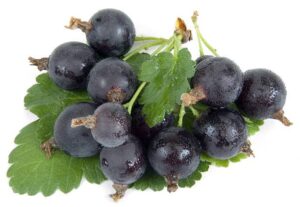 Rich in Antioxidants
Rich in Antioxidants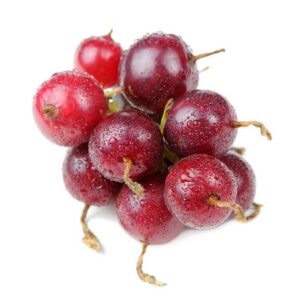 Anti-Inflammatory Properties
Anti-Inflammatory Properties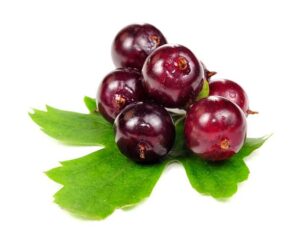 Supports Immune Function
Supports Immune Function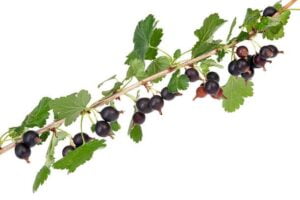 Promotes Heart Health
Promotes Heart Health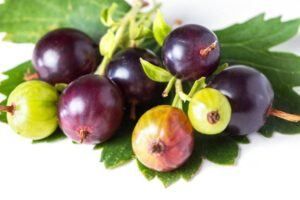 Potential Anti-Cancer Effects
Potential Anti-Cancer Effects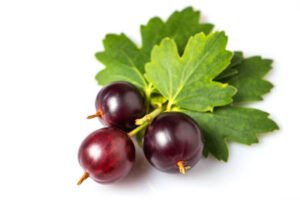 Improves Digestive Health
Improves Digestive Health